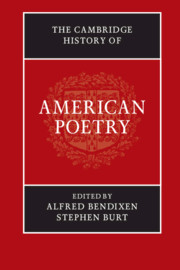Book contents
- The Cambridge History of American Poetry
- The Cambridge History of American Poetry
- Copyright page
- Contents
- Notes on Contributors
- Acknowledgments
- Introduction
- Part I Beginnings: Poetry before 1800
- Part II A New Nation: Poetry from 1800 to 1900
- Part III Forms of Modernism, 1900–1950
- Part IV Beyond Modernism: American Poetry, 1950–2000
- Chapter 36 San Francisco and the Beats
- Chapter 37 The New York School
- Chapter 38 The Uses of Authenticity
- Chapter 39 James Merrill and His Circles
- Chapter 40 Science in Contemporary American Poetry
- Chapter 41 The 1970s and the “Poetry of the Center”
- Chapter 42 Latino Poetry and Poetics
- Chapter 43 Asian American Poetry
- Chapter 44 Psychoanalytic Poetics
- Chapter 45 American Poetry of the 1980s
- Chapter 46 Black and Blues Configurations
- Chapter 47 Amy Clampitt, Culture Poetry, and the Neobaroque
- Chapter 48 Modern and Contemporary Children’s Poetry
- Chapter 49 Multilingualism in Contemporary American Poetry
- Chapter 50 American Poetry at the End of the Millennium
- Selected Bibliographies
- Index
Chapter 44 - Psychoanalytic Poetics
from Part IV - Beyond Modernism: American Poetry, 1950–2000
Published online by Cambridge University Press: 05 December 2014
- The Cambridge History of American Poetry
- The Cambridge History of American Poetry
- Copyright page
- Contents
- Notes on Contributors
- Acknowledgments
- Introduction
- Part I Beginnings: Poetry before 1800
- Part II A New Nation: Poetry from 1800 to 1900
- Part III Forms of Modernism, 1900–1950
- Part IV Beyond Modernism: American Poetry, 1950–2000
- Chapter 36 San Francisco and the Beats
- Chapter 37 The New York School
- Chapter 38 The Uses of Authenticity
- Chapter 39 James Merrill and His Circles
- Chapter 40 Science in Contemporary American Poetry
- Chapter 41 The 1970s and the “Poetry of the Center”
- Chapter 42 Latino Poetry and Poetics
- Chapter 43 Asian American Poetry
- Chapter 44 Psychoanalytic Poetics
- Chapter 45 American Poetry of the 1980s
- Chapter 46 Black and Blues Configurations
- Chapter 47 Amy Clampitt, Culture Poetry, and the Neobaroque
- Chapter 48 Modern and Contemporary Children’s Poetry
- Chapter 49 Multilingualism in Contemporary American Poetry
- Chapter 50 American Poetry at the End of the Millennium
- Selected Bibliographies
- Index
Summary
- Type
- Chapter
- Information
- The Cambridge History of American Poetry , pp. 1003 - 1026Publisher: Cambridge University PressPrint publication year: 2014
- 1
- Cited by



